Divya Sukta – Rasa

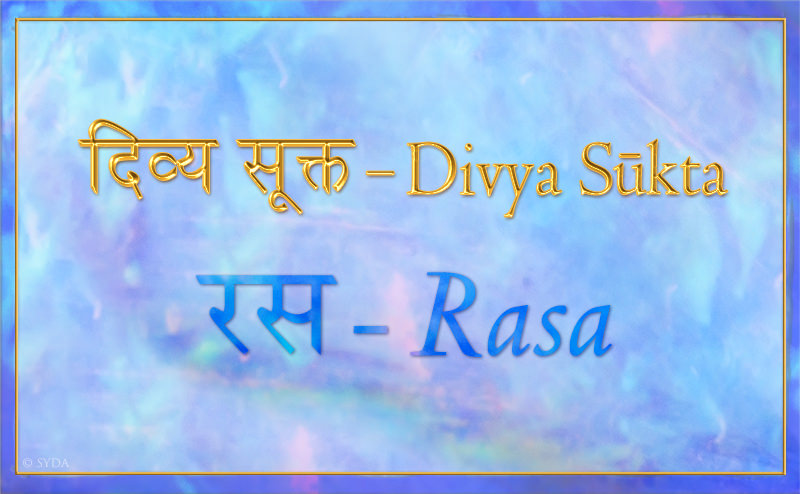
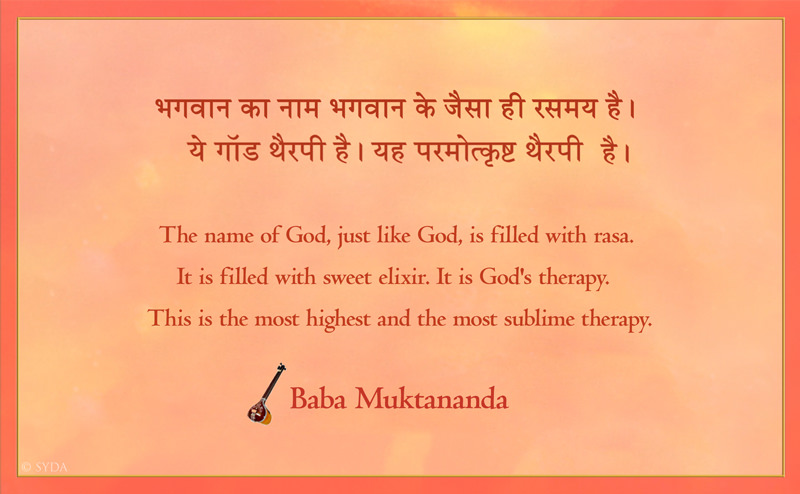
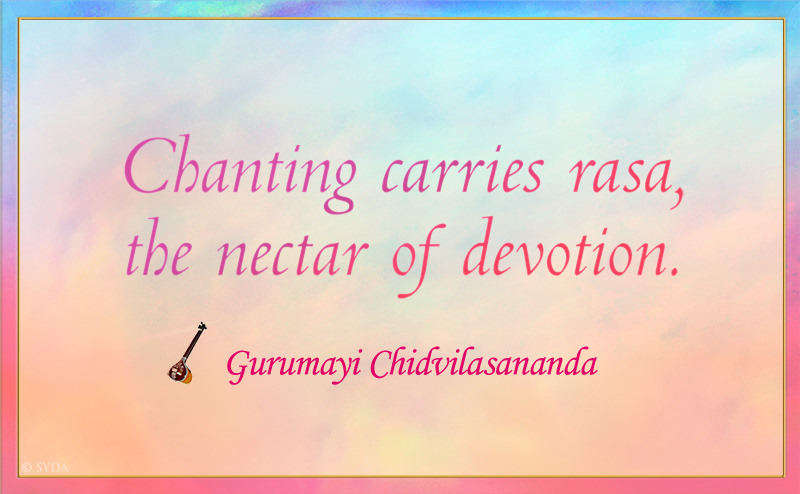
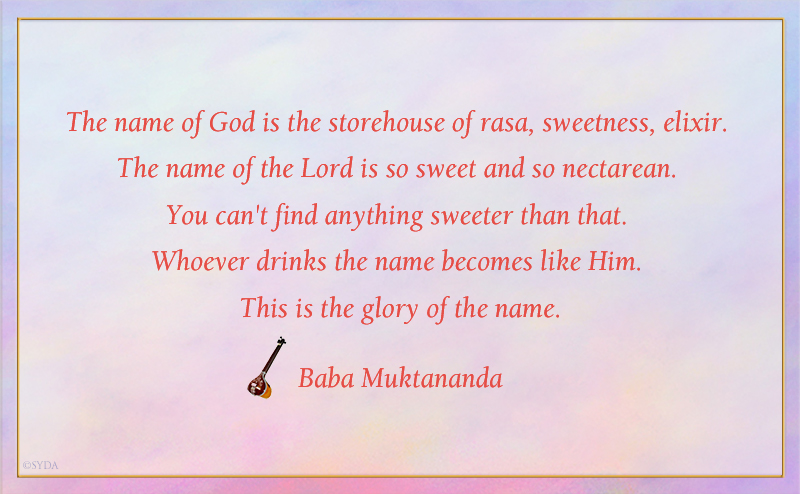
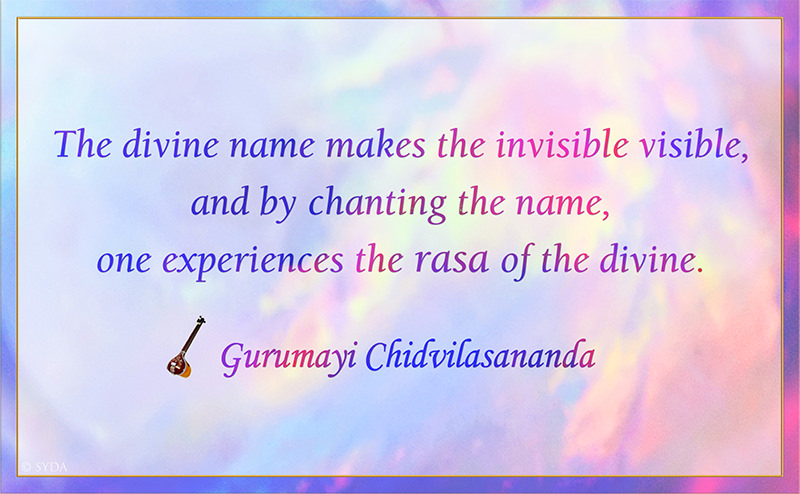
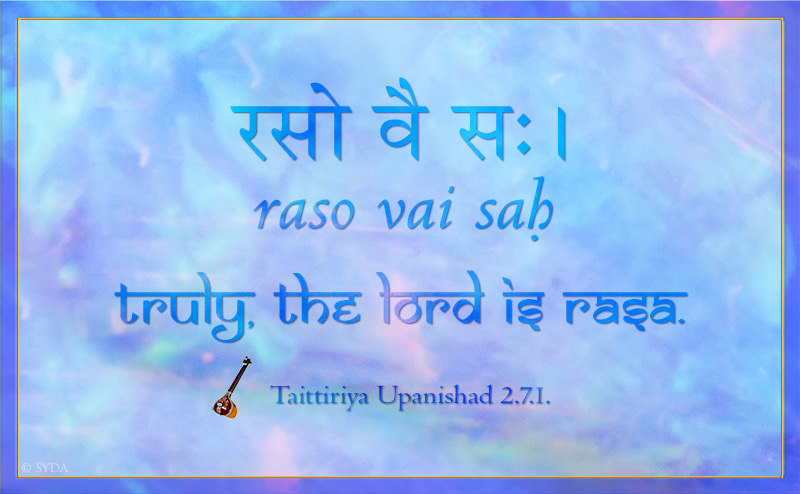
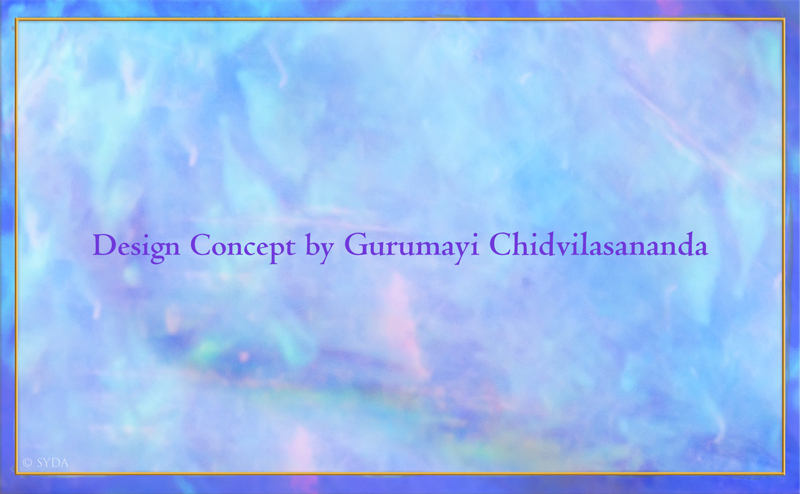
cover-rasa-v2
baba-sweet-elixir-v2
gurumayi-chanting
baba-name-of-god-v2
gurumayi-divine-name
taittiriya-2_7_1
end
In the Sanskrit language, divya means divine and sūkta refers to a statement that illumines the highest Truth. Divya Sūkta: Teachings about the Divine.
I recently increased my practice of chanting to include chanting in the morning when I am preparing meals for the day. Since I began chanting more, I have been experiencing more order and tranquility in my mind, and this has subtly expressed itself in my ability to surmount challenges. I am experiencing an inner prompting to clean, organize, and plan that is helping me to create clarity.
Willemstad, Curacao
As I read the Divya Sukta, I connected to the experience of existence, consciousness, and bliss. While offering seva , I chanted Baba’s name and I experienced the bliss of freedom. Deep devotion arose within me.
Bangalore, India
This divine statement from the Taittiriya Upanishad –"Truly, the Lord is rasa" — rings so true for me! Especially after chanting!
Every time I chant the Lord’s name with the sangham at the local Siddha Yoga Meditation Center, I find myself filled with that rasa, which is the Lord, which is peace, bliss, and love for everyone and everything.
Every time I chant the Lord’s name with the sangham at the local Siddha Yoga Meditation Center, I find myself filled with that rasa, which is the Lord, which is peace, bliss, and love for everyone and everything.
California, United States
How wonderful it is to know that this divine therapy is always available to us! What solace and happiness does this bring!
Thank you.
Thank you.
Florida, USA
I believe life itself is very much like music—with its highs and lows, its fast and slow pacing, and its ups and downs. So chanting the name of God helps me tune myself up and harmonize with the varied situations I experience in my daily life.
I have also learned from experience that, in order to replenish myself and regenerate the cells in every part of my body, I need the rasa released in chanting. So, whenever I allow the sound of the chant to flow through my body, I feel that I myself become the chant. Only then do I find true and enduring vitality, tranquility, and contentment. There is no better therapy, indeed!
Thank you, Baba and Gurumayi, for nourishing my mind and my soul with the most sublime therapy—the name of God.
I have also learned from experience that, in order to replenish myself and regenerate the cells in every part of my body, I need the rasa released in chanting. So, whenever I allow the sound of the chant to flow through my body, I feel that I myself become the chant. Only then do I find true and enduring vitality, tranquility, and contentment. There is no better therapy, indeed!
Thank you, Baba and Gurumayi, for nourishing my mind and my soul with the most sublime therapy—the name of God.
Buenos Aires, Argentina
As I reflect on this teaching from Gurumayi, I am brought back into an experience I have been having lately.
When I chant or repeat God’s name—or even think of God’s name—I experience sweet juice flowing out from the name. It seems to be unending, as if the name were an inexhaustible reservoir of sweetness, of love. I remember a devotional song in the Marathi language that says: “O Lord! Your Name is so much sweeter than nectar.”
Gurumayi, thank you for the blessing of chanting.
Gurudev Siddha Peeth
In this new teaching, the word devotion seems highlighted for me. When I am filled with devotion and sending out the chant’s vibrations of love from my heart to the Guru, to the world, I am really sending out love to myself, the great Self, and then the nectar of rasa is reflected back to me from the magical mirror of the Self!
Thank you, Gurumayi.
New York, USA
While reading this teaching in Divya Sukta, I am drawn to contemplate the word carries. I realize that when my heart is overflowing with devotion during chanting, I feel carried on waves of divine nectar and taste its droplets of bliss.
New York, USA
Chanting has always been my favorite Siddha Yoga practice. I come from a family of musicians and singers. So music has always been the language through which we communicate and celebrate. I have learned from an early age that chanting is the best means to heal and transform, within and without.
After receiving shaktipat initiation, I was motivated by the sweet joy Siddha Yoga chanting had brought to my own sadhana to introduce chanting as a regular family practice. My eldest daughter was very shy as a child, and would often stutter when nervous. She says that chanting the mantra has helped her overcome her speech and reading difficulties. My youngest son says that he loves chanting because it “replaces all the words in his head” and because it increases his concentration and gives him a keener, yet peaceful, mind.
We have all benefited enormously from our family practice of chanting, and each one of us is deeply grateful for the gifts received.
After receiving shaktipat initiation, I was motivated by the sweet joy Siddha Yoga chanting had brought to my own sadhana to introduce chanting as a regular family practice. My eldest daughter was very shy as a child, and would often stutter when nervous. She says that chanting the mantra has helped her overcome her speech and reading difficulties. My youngest son says that he loves chanting because it “replaces all the words in his head” and because it increases his concentration and gives him a keener, yet peaceful, mind.
We have all benefited enormously from our family practice of chanting, and each one of us is deeply grateful for the gifts received.
Punta del Este, Uruguay
Upon reading the divya sukta, I decided to put this precious knowledge into practice by chanting God’s name aloud for a set amount of time. I chanted with the awareness that I was offering the words to God as my heart’s prayer.
By the time I completed the chant, my state was transformed and I was experiencing joy, confidence, and easefulness. I have had this experience of chanting in the past too, but this time it was new as I recognized that joy and that feeling as God in the form of rasa.
I am so grateful to Gurumayi for making the divine knowledge of the scriptures manifest in my life in tangible experiences.
By the time I completed the chant, my state was transformed and I was experiencing joy, confidence, and easefulness. I have had this experience of chanting in the past too, but this time it was new as I recognized that joy and that feeling as God in the form of rasa.
I am so grateful to Gurumayi for making the divine knowledge of the scriptures manifest in my life in tangible experiences.
New York, United States
In the evening, before meditation, chanting the sacred mantra Om Namah Shivaya carries me into a wonderful space where all my worries and fears melt away, giving way to healing waves of love, light, and indescribable peace and calm in the depths of my heart.
St. Laurent, Canada
Gurumayi’s golden teaching on chanting, “Chanting carries rasa, the nectar of devotion,” inspires me to chant more and to enjoy the rasa within.
Her teaching also brought me a sweet remembrance of my recent visit to Gurudev Siddha Peeth, where the practice of chanting echoes in every corner of the Ashram premises. During my daily walk to Dakshin Kashi, I could listen to the practice of chanting from different directions of the Ashram, and I would experience immense happiness and love for God’s amazing manifestation of expansion and contraction.
I am grateful to Shri Gurumayi for teaching me to sing God’s name with an open heart.
Her teaching also brought me a sweet remembrance of my recent visit to Gurudev Siddha Peeth, where the practice of chanting echoes in every corner of the Ashram premises. During my daily walk to Dakshin Kashi, I could listen to the practice of chanting from different directions of the Ashram, and I would experience immense happiness and love for God’s amazing manifestation of expansion and contraction.
I am grateful to Shri Gurumayi for teaching me to sing God’s name with an open heart.
Bedford Gardens, South Africa
In contemplating how the invisible becomes visible, I recalled a recent moment in the kitchen grating some lemon rind. With the action of the grater, that remarkable lemony fragrance was released into the air and filled the kitchen. What was fundamental to the lemon but could not be sensed in its quiescent state became manifest.
Similarly, through the practice of chanting the Name, I experience an elixir being released from within. The essential joy that is fundamental to my own nature, though not always apparent to my everyday mind, becomes abundantly manifest. And if the subtly layered fragrance of a lemon is difficult to put into words, then how much more so that ambrosial mix of divine rasa that sweeps through me in the midst of a chant.
Similarly, through the practice of chanting the Name, I experience an elixir being released from within. The essential joy that is fundamental to my own nature, though not always apparent to my everyday mind, becomes abundantly manifest. And if the subtly layered fragrance of a lemon is difficult to put into words, then how much more so that ambrosial mix of divine rasa that sweeps through me in the midst of a chant.
New York, USA
Just last week, during the satsang at the local Siddha Yoga meditation center, I was having the experience of truly relishing repeating Baba’s name. As the chant got faster, my joy increased and each syllable seemed filled with a heavenly nectar.
Massachusetts, USA
I read and reread the words, "The divine name makes the invisible visible," and what came to me was the name Gurumayi–the name of my Guru, who is the divine made visible. I am so full of gratitude for the Guru, because of whom I will never doubt the existence of an invisible God.
In her generosity, Gurumayi has given us the knowledge that by chanting the name of God, we can experience God within. Through chanting, God is made tangible by our own voices. We can taste the sweetness of God on our tongues. How beautiful, simple, and supremely reassuring.
In her generosity, Gurumayi has given us the knowledge that by chanting the name of God, we can experience God within. Through chanting, God is made tangible by our own voices. We can taste the sweetness of God on our tongues. How beautiful, simple, and supremely reassuring.
New York, USA
After reading this posting, I was pleasantly surprised to become aware of important recent changes occurring in my life. Since increasing my practice of chanting these past months, I have let go of many unnecessary activities, de-cluttered my house, and arranged to spend more quality time in satsang and with friends.
I realize that the inner rasa of bliss that comes from chanting has supported me in making life choices that create more sacred spaces in my life. Now, more and more, the rasa of bliss of my outer world matches the rasa of bliss of my inner world.
New York, USA
Last night in a study group, we were discussing the chapter in Gurumayi’s book The Yoga of Discipline entitled, "What enters your ears goes straight to your heart." We were glorying in the idea that chanting was a way of practicing the yoga of discipline. We also explored what it might mean, as Gurumayi teaches, that the purpose of the senses is to perceive God.
These words from the Taittiriya Upanishad give me another angle to understand that teaching: that my senses provide amazing opportunities to appreciate the bounty of beauty in the world.
These words from the Taittiriya Upanishad give me another angle to understand that teaching: that my senses provide amazing opportunities to appreciate the bounty of beauty in the world.
Minnesota, USA
For quite some time, I have followed the practice of meditating on nature for five minutes each morning. This morning, when I stepped outside, I was immediately immersed in the brightness of the sunlight reflected by the snow under a very blue sky; and I was sweetly aware of the coolness of the air against my skin. As I watched my breath, I drank in the exquisiteness of the moment. I felt so content. I felt that this moment was perfect, that this was a moment to savor. I thought, “This is rasa."
When I came inside, I re-read the Siddha Yoga definition for rasa from the website glossary: 1) Flavor, taste. 2) A subtle energy of richness, sweetness, and delight. I knew that what I had experienced was the savoring of rasa. The sublime contentment that I experienced was communion with the Lord.
When I came inside, I re-read the Siddha Yoga definition for rasa from the website glossary: 1) Flavor, taste. 2) A subtle energy of richness, sweetness, and delight. I knew that what I had experienced was the savoring of rasa. The sublime contentment that I experienced was communion with the Lord.
Alaska, USA
I have been contemplating the teaching raso vai sah, and what I realize is that to know the Self is to experience ecstasy and bliss and that Siddha Yoga chanting has the power to bring my awareness to this space. I also understand that the Guru is the embodiment of ecstasy.
This morning, while I was taking a shower, I was repeating the mantra. I visualized my body being cleansed by the mantra and radiating the light of the Self. I now know that I embody bliss as well.
This morning, while I was taking a shower, I was repeating the mantra. I visualized my body being cleansed by the mantra and radiating the light of the Self. I now know that I embody bliss as well.
Niteroi, Brazil
One evening last week, I walked up the driveway to check the mail. As I reached the top of the driveway, to my left the entire horizon was lit by a brilliant gold, orange, pink, and red sunset. It was so breathtaking, I had to stand still and completely absorb this gift I was given in that moment. I could not turn away from it.
When I read this sukta, it brought true joy to know I was experiencing the Lord in that moment. I will carry this awareness with me each time I am given such a moment.
When I read this sukta, it brought true joy to know I was experiencing the Lord in that moment. I will carry this awareness with me each time I am given such a moment.
Georgia, United States
It is good to be reminded of this wonderful, divine rasa. My family, nature, reciting Shri Guru Gita (and other chants)—these are already familiar sources of this rasa to me. But now I have resumed offering seva in the Siddha Yoga Ashram in Oakland, and this practice has a very special rasa for me!
I am so grateful for the Siddha Yoga path, which opens so many doors to me to savor the rasa of life in my being.
I am so grateful for the Siddha Yoga path, which opens so many doors to me to savor the rasa of life in my being.
California, United States
Today when I woke up, I felt inside of me a subtle, sweet, and blessed state filled with this divine rasa, like the blossoming of a white flower after the rain.
Milan, Italy
After contemplating this teaching, I realized that doing what one loves, that which absorbs the whole being, brings the experience of divine rasa. And when I do what I love, the bliss is tangible, signifying to me that the Lord within is very much pleased.
California, United States
I’ve often paused during my day to savor moments of beauty—spring blossoms, a gray-blue sky, the morning rain—but not until today did I realize that these moments of beauty are actually reflecting the bliss within me, the bliss of the indwelling Lord.
Washington, USA
This verse resonates so deeply with me. I know that rasa means flavor or taste, but I looked up the word in the glossary on the Siddha Yoga path website to see if there was further explanation. I’m so glad I did. Because the second definition given makes the meaning of the verse even more wonderful: "A subtle energy of richness, sweetness, and delight."
When we align our lives to recognize that we are not different from the Lord, we can live entirely within this rasa. Truly.
When we align our lives to recognize that we are not different from the Lord, we can live entirely within this rasa. Truly.
Michigan, USA
This beautiful and subtle teaching from the Taittiriya Upanishad is one I have studied and reflected upon over the past few years. Baba and Gurumayi are constantly inviting us to experience and taste the rasa—the blissful essence—of life. This invitation is present in the myriad ways Gurumayi teaches us to become truly sensitive to the natural world that surrounds and encompasses us.
One of the ways I have practiced this teaching, as I have studied it, is by becoming aware of the beauty that pulsates within the variety of objects and events of life, below their surface features. The more I am able to see the underlying essence, the sublime rasa, within the objects and events of life, be it a piece of music or inner feelings and thoughts that bubble up, the more I am able to relish them. Beyond the inherent joy of experiencing this very subtle flavor of life in objects, people, animals, thoughts, and emotions, the wisdom of the Upanishad offers a stunning revelation: that very joy is actually the light of divinity; God in the form of bliss.
One of the ways I have practiced this teaching, as I have studied it, is by becoming aware of the beauty that pulsates within the variety of objects and events of life, below their surface features. The more I am able to see the underlying essence, the sublime rasa, within the objects and events of life, be it a piece of music or inner feelings and thoughts that bubble up, the more I am able to relish them. Beyond the inherent joy of experiencing this very subtle flavor of life in objects, people, animals, thoughts, and emotions, the wisdom of the Upanishad offers a stunning revelation: that very joy is actually the light of divinity; God in the form of bliss.
a Siddha Yoga meditation teacher
When I saw these words from the Upanishads written so beautifully with the iridescent opal colors in the background, it evoked in my heart the nectarean sweetness it refers to.
One of the themes of the Taittiriya Upanishad is that the true nature of all bliss and happiness is Brahman, the Lord or Supreme Self of all. It is this indwelling Lord who is the source of all the beauty, happiness, and joy we experience. Simply by focusing on and understanding the true nature of the drops and rivulets of sweetness that we experience in our daily life and spiritual practice,we are able to enter the immense ocean of joy and bliss.
This sutra reminds me of why chanting is so powerful and liberating. As I savor and follow the meaning of each syllable and the melodious sound of each note inward to its source, my heart tastes the love and sweetness that is the Lord’s essential nature. When I do this, I can share this rasa, the divine sweetness of the Self, through my thoughts, feelings, and actions.
Thank you, Gurumayi, for teaching us how to experience God’s love and sweetness through Siddha Yoga chanting!
One of the themes of the Taittiriya Upanishad is that the true nature of all bliss and happiness is Brahman, the Lord or Supreme Self of all. It is this indwelling Lord who is the source of all the beauty, happiness, and joy we experience. Simply by focusing on and understanding the true nature of the drops and rivulets of sweetness that we experience in our daily life and spiritual practice,we are able to enter the immense ocean of joy and bliss.
This sutra reminds me of why chanting is so powerful and liberating. As I savor and follow the meaning of each syllable and the melodious sound of each note inward to its source, my heart tastes the love and sweetness that is the Lord’s essential nature. When I do this, I can share this rasa, the divine sweetness of the Self, through my thoughts, feelings, and actions.
Thank you, Gurumayi, for teaching us how to experience God’s love and sweetness through Siddha Yoga chanting!
a Siddha Yoga Swami

